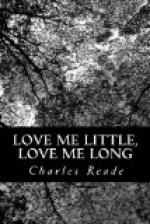“The sea has not got up yet, miss,” said Jack.
“Hasn’t it? the waves seem very large.”
“Lord love you, wait till we have had four or five hours more of this.”
“Belay your jaw, Jack.”
“Ay, ay, sir.”
“Why so, Mr. Dodd?” objected Lucy gently. “I am not so weak as you think me. Do not keep the truth from me. I share the danger; let me share the sense of danger, too. You shall not blush for me.”
“Danger? There is not a grain of it, unless we make danger by inattention—and babbling.”
“You will not do that,” said Lucy.
Equivoque missed fire.
“Not while you are on board,” replied David, simply.
Lucy felt inclined to give him her hand. She had it out half-way; but he had lately asked her to marry him, so she drew it back, and her eyes rested on the bottom of the boat.
The wind rose higher. The masts bent so that each sail had every possible reef taken in. Her canvas thus reduced she scudded as fast as before, such was now the fury of the gale. The sea rose so that the boat seemed to mount with each wave as high as the second story of a house, and go down again to the cellar at every plunge. Talboys, prostrated by seasickness in the forehold, lay curled but motionless, like a crooked log, and almost as indifferent to life or death. Lucy, pale but firm, put no more questions that she felt would not be answered, but scanned David Dodd’s face furtively yet closely. The result was encouraging to her. His cheek was not pale, as she felt her own. On the contrary, it was slightly flushed; his eye bright and watchful, but lion-like. He gave a word or two of command to Jack every now and then very sharply, but without the slightest shade of agitation, and Jack’s “ay, ay” came back as sharply, but cheerfully.
The principal feature she discerned in both sailors was a very attentive, business-like manner. The romantic air with which heroes face danger in story was entirely absent; and so, being convinced by his yarns that David was a hero, she inferred that their situation could not be dangerous, but, as David himself had inferred, merely one in which watchfulness was requisite.
The sun went down red and angry. The night came on dark and howling. No moon. A murky sky, like a black bellying curtain above, and huge ebony waves, that in the appalling blackness seemed all crested with devouring fire, hemmed in the tossing boat, and growled, and snarled, and raged above, below, and around her.
Then, in that awful hour, Lucy Fountain felt her littleness and the littleness of man. She cowered and trembled.
The sailors, rough but tender nurses, wrapped shawls round her one above the other, “to make her snug for the night,” they said. They seemed to her to be mocking her. “Snug? Who could hope to outlive such a fearful night? and what did it matter whether she was drowned in one shawl or a dozen?”




